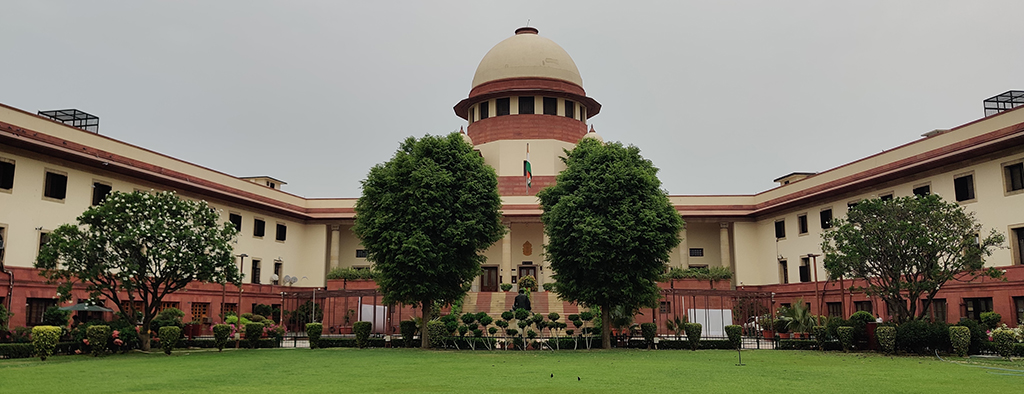The Supreme Court ruled that defaulting members of a society are not entitled to receive notice of an election meeting under Section 15 of the Societies Registration Act, 1860 (Registration Act), even if their membership was not cancelled or discontinued. The court granted an appeal contesting the Bombay High Court’s upholding of the decision to reject an earlier appeal concerning changes in the leadership of the nonprofit organization Shikshan Prasarak Mandal, Mul. The Court observed that the proviso to Section 15 labels objectors as suspended members, leaving them ineligible for notice without voting rights or member status, even though the society’s bye-laws do not automatically terminate for defaulting members.
“A clear reading and interpretation of the proviso to Section 15 of the Registration Act would disentitle such defaulting members from being given any notice even if their membership was not terminated or ceased,” the Bench made up of Justices Vikram Nath and Ahsanuddin Amanullah said. Senior Advocates Narender Hooda and Shekhar Naphade represented the Respondents and Appellants, respectively. Appellant No. 1 was named Working President in 1997 following the passing of important office holders, and a new Executive Committee was elected in 2002. There were protests made over the election procedure, and the Assistant Charity Commissioner first turned away some members. The Change Report was authorized by the Joint Charity Commissioner in 2016, however District Judge Chandrapur, IV, reversed this ruling. The initial appeal was dismissed by the Bombay High Court.
Undisputed facts include Appellant No. 1’s ongoing duty as Working President, the objectors’ death during the appeal, the objectors’ payment default that rendered them ineligible to vote, and the lack of elected office bearers prior to 2002. The legal arguments centre on challenges to the appellants’ twenty-plus years of control over society and trust, as well as changes in leadership. The Supreme Court received an appeal contesting the Bombay High Court’s upholding of the dismissal of an earlier appeal concerning changes in leadership of the nonprofit organization Shikshan Prasarak Mandal, Mul. The following issues were posed by the Court:
i) Whether the Working President Mr Wasade could have convened the election meeting for 08.09.2002 as according to the Objectors, it was only the Secretary or in the alternative the President who could have convened the meeting under the bye laws?
ii) Whether the 7 Objectors were entitled to a notice for the meeting of 08.09.2002 in view of their disqualification under Section 15 of the Registration Act?
iii) Whether lack of notice to the said Objectors would vitiate the entire election meeting of 08.09.2002?
iv) Whether invalid members had signed the requisition dated 20.08.2002 and had been elected to the Executive Committee?
v) Whether the private respondents had the locus to be heard before any forum or to file an appeal/petition against the order of the Joint Charity Commissioner?
Due to the then-President’s health, the Court unanimously named Mr. Wasade as Working President on July 1, 1997, taking note of the Executive Body meeting. Important office bearers had died before August 20, 2002, hence calling a meeting fell on the Working President.

Acknowledging the necessity doctrine, the Court highlighted its application in exceptional circumstances to support actions that depart from the norm. In this instance, the Working President was instrumental in averting a standoff by giving specific requests from the 16 members who were still alive. The Court noted that the ‘Working President’ was required to obey orders in accordance with Byelaws Clause 11. After 16 formal requests, it was decided that the remaining members’ request to call a meeting was legitimate. The Working President’s decision to call the meeting on September 8, 2002, was deemed impeachable by the Bench in light of the facts. The first issue was resolved in the appellants’ favour.
The High Court and all three authorities had confirmed that all Objectors had been behind on their membership dues for more than three months, a fact that the Court acknowledged. Concerns over the ramifications of non-payment under Section 15 of the Registration Act were raised by the Objectors’ reluctance to accept notices. The Bench states that it is pointless to not provide notices because non-paying members are not allowed to vote and are not regarded as members of the society. In the absence of automatic termination under the bye-laws, defaulters’ names remained on the Society’s Roll. A readiness to settle dues application was required for reinstatement, pending review by the Society.
Show cause notices were used as a legal remedy to give defaulters an opportunity to keep their membership by meeting their duties. Due process was followed in the termination due to the failure. The Court highlighted the legitimacy of such provisions in connection with pertinent elements of the governing legislation, drawing comparisons with a case that was comparable to its own. The Bench cited Hyderabad Karnataka Education Society v. Registrar of Societies and Others [(2000) 1 SCC 566] and observed that the proviso to Section 15 of the Registration Act classified Objectors as suspended members since the Society’s bye-laws did not provide for an immediate cessation. Because they were not members and could not vote, they were not eligible to receive notices.
Concerning invalid members taking part in requisitions and executive elections, the appellants countered that signatories were properly allowed in an earlier meeting and that objections regarding retired members were postponed because they lacked vital information. All seven of the objectors died during the appeal, which is why the Commissioner decided to grant the appellants’ request and accept the Change Report. The respondent who was challenging, claiming to be the Vice-President, did not have standing because they were neither a legitimate member of the society nor an objector before the Assistant Charity Commissioner. The respondent’s petition was dismissed by the District Judge for lack of evidence.
The Court saw an inexplicable feature: four retired Employee Members kept up their membership and made subscription payments. After their retirement without a suitable settlement, the Court questioned the validity of their ongoing membership in the Employee Members category. It was decided that new elections for a new Executive Committee within six months were required due to the Society’s protracted impasse. The Charity Commissioner was assigned to conduct a comprehensive investigation, settle membership disputes using the documentation already in place, and guarantee a transparent and equitable election procedure. As a result, the Court granted the Appeal, overturned the contested High Court decision and order, upheld the Change Report, and mandated that the Charity Commissioner hold new elections for the Society’s Executive Committee in accordance with the law within six months.


